Most Cajuns live in the heat.
On Saturday, the ones from Lafayette couldn’t handle it.
While college football contests take 60 game minutes to complete, Mizzou needed much less time to establish itself as the superior team, dominating Louisiana 52-10.
Mizzou won almost every aspect of the game by a country mile. The Tigers had 606 total yards (their most since September 2021) and held the ball for more than 42 minutes. The Ragin’ Cajuns, meanwhile, looked stuck in the 1900s, totaling 4 passing yards and going 1-of-11 on third down. Mizzou had as many 100-yard rushers as Louisiana had pass completions (two).
The main driver of MU’s offensive success was a relentless rushing attack.
Over 700 miles separate Columbia from Lafayette, Louisiana. The rushing attacks of the two programs seemed thousands of miles apart.
The Tigers were dominant on the ground, racking up 427 rushing yards on 62 carries. It marked the first time since November 2017 that MU rushed for at least 400 yards in a game.
Meanwhile, the Ragin’ Cajuns had a solid day running the ball on the surface, logging 117 rushing yards on 22 attempts. But one of those carries was an 84-yard touchdown by Zylan Perry, as he took advantage of MU defenders failing to shed blocks and took off down the middle of the field.
“That’s got to get taken off the tape,” coach Eli Drinkwitz said.
Not including the flash of lightning from Perry, Louisiana had 33 rushing yards on 21 carries. The same team that ran for 315 yards last week against McNeese State couldn’t do much against a Mizzou defense that had allowed fewer than 2 yards per carry against Kansas.
Bill Davis, who had 132 rushing yards last week for Louisiana, had 1 rushing yard on just six carries.
Ahmad Hardy had a career-high with 250 yards on 22 carries and three touchdowns, including a 71-yard house call in the second quarter. His rushing total was the seventh-most by a Tiger in a single game.
While at Louisiana Monroe, Hardy had 172 rushing yards against Louisiana. He surpassed that total in the first half Saturday, logging 187 through the first two quarters. He outdid his previous career-high on his first carry of the second half, a 20-yard gain. It was one of nine carries of at least 10 yards on the afternoon for the superstar sophomore.
“Every time I touch the ball,” Hardy said, “I’m thinking I’m going to score.”
Freshman Marquise Davis made the most of extended playing time with 113 yards on 20 carries. Jamal Roberts averaged almost 6 yards per carry, and Beau Pribula also scored a 14-yard rushing touchdown.
“Our two young running backs, Marquise and (Brendon) Haygood, are going to be really, really bright spots for us in the future,” Drinkwitz said. “They’ve just got to continue to believe in development.”
In MU’s previous two games, Hardy and Roberts often had to elude defenders at or behind the line of scrimmage. Drinkwitz said last week that the two had to “be their own blocker” at times, which MU wanted to avoid going forward. That’s exactly what happened Saturday, as lanes were open like I-70 in the early morning.
“I thought they did a nice job,” Drinkwitz said of the offensive line. “We were able to get our outside zone going.”
Veteran center Connor Tollison pointed to improvement between Weeks 2 and 3.
“I think we did better today in communication,” Tollison said.
Through three games, the Tigers (3-0) have out-rushed their opponents in impressive ways. Against Central Arkansas, Mizzou had 65 more rushing yards on one fewer carry than the Bears. Against Kansas, MU had 230 more rushing yards than the Jayhawks, its largest difference in rushing since the 2022 season opener against Louisiana Tech (plus-315).
The difference in rushing totals between the teams Saturday was 310.
Changing of the (right) guard
To start the second quarter, Tristan Wilson played right guard for Mizzou, taking the place of redshirt junior Curtis Peagler, who had started each of MU’s first three contests at right guard. Wilson had only taken 25 snaps at offensive line entering Saturday.
Throughout the game, Peagler and Wilson rotated at right guard. It was a competition that garnered attention in the latter stages of fall camp, with Peagler ultimately winning. But it seems like the competition isn’t quite over.
“We just felt like there’s some meat left on that bone as far as improvement,” Drinkwitz said. “You’re going to need more guys than just five, so let’s start rotating those guys and see if we can create some depth and competition.”
Meyer’s miss
One concern for Mizzou coming out of Saturday’s game might be the field goal kicking.
While Robert Meyer converted each of his six extra-point attempts and a 22-yard chip shot at the end of the first half, he missed a 41-yard field goal wide right late in the third quarter, and the kick didn’t look close at any point during the ball’s ascent. The snap/hold combination was clean, and the ball wasn’t deflected on its way up.
Earlier in the week, Drinkwitz set Meyer’s range at 52 yards and under, stating a desire to get the redshirt freshman going from closer in before he tasked him with longer field goals.
“Sometimes, you need to see that 3-foot putt go in the hole before you back it up to a 12-footer,” Drinkwitz said Tuesday. “You want to see the ball go through the net before you back it up to that 3-point shot.”
For Meyer, the three-point shots might have to wait a little longer.
Fau-roast Field
Becuase of extreme heat in Saturday’s forecast, kickoff was moved to noon from its original time slot of 3 p.m.
Despite the change, Memorial Stadium still felt like an oven, as field temperatures were in the triple-digits right before kickoff.
Members of Marching Mizzou weren’t wearing their regular uniforms; rather, they donned short-sleeved polos and khaki shorts.
When the third quarter started, most of the student section was empty, although the blazing heat and dominant performance from MU made leaving slightly more acceptable than usual.
“I totally understand them leaving at halftime,” Drinkwitz said. “It was a little bit hot out there.”
While the change in kickoff time didn’t fully avert hot weather, it could’ve been worse had the game started at 3 p.m. According to Drinkwitz, the actual turf surface at the end of the game was 176 degrees.
“That’s a player safety issue,” Drinkwitz said. “We don’t really have any way to cool that turf down with those pellets. That’s why it was so critical for us to move this game up.”
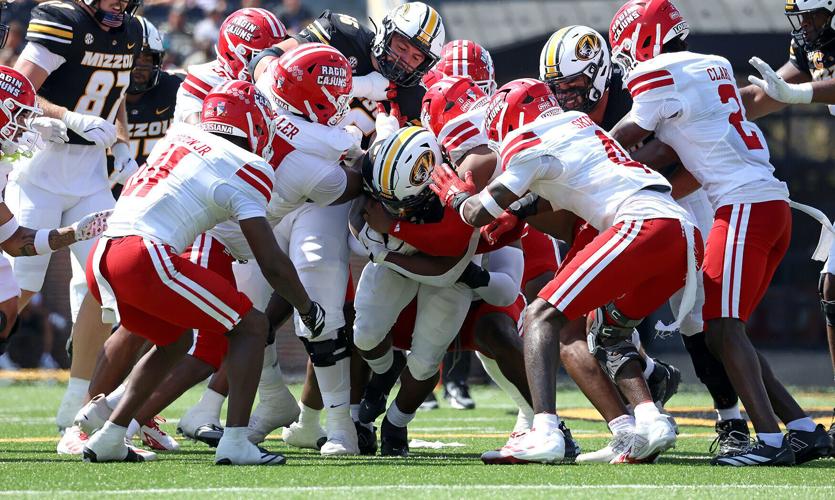
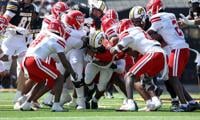

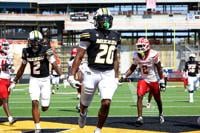

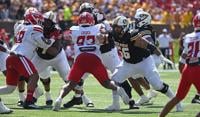

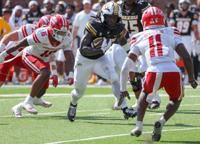

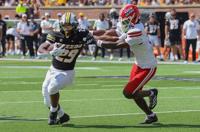

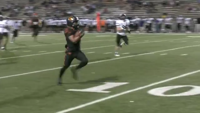

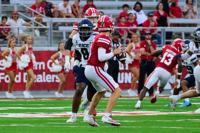







(0) comments
Welcome to the discussion.
Log In
Keep it Clean. Please avoid obscene, vulgar, lewd, racist or sexually-oriented language.
PLEASE TURN OFF YOUR CAPS LOCK.
Don't Threaten. Threats of harming another person will not be tolerated.
Be Truthful. Don't knowingly lie about anyone or anything.
Be Nice. No racism, sexism or any sort of -ism that is degrading to another person.
Be Proactive. Use the 'Report' link on each comment to let us know of abusive posts.
Share with Us. We'd love to hear eyewitness accounts, the history behind an article.